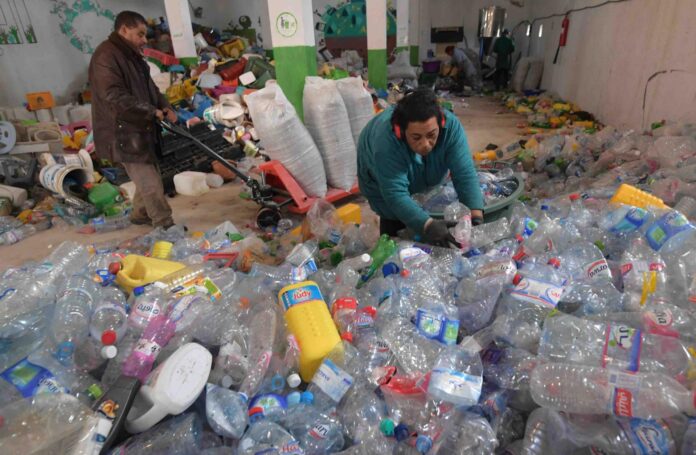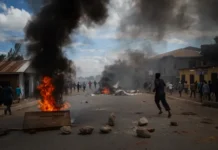With a towel draped over his head to shield himself from the summer heat, Hamza Jabbari carefully sets sacks of plastic bottles onto a scale in Bhar Lazreg, a working-class neighborhood north of Tunis. Jabbari is one of Tunisia’s growing number of “barbechas,” informal waste pickers whose rise has become a visible symptom of the country’s worsening economic and migration crises.
Jabbari, in his 40s, begins his day at dawn, scouring garbage bins and public spaces for plastic waste before municipal trucks and rival collectors beat him to it.
“It’s the most accessible work in Tunisia when there are no job offers,” he said.
The job, though physically demanding, offers little financial reward. A kilogram of plastic bottles sells for only 0.5 to 0.7 Tunisian dinar, the equivalent of less than 25 U.S. cents. Yet in cities like Tunis, the sight of men weaving through traffic with plastic-laden motorcycles or women hunched under heavy sacks of recyclables has become increasingly common.
“Everyone does it,” Jabbari said. “It’s how people get by.”
A Growing, Yet Invisible Workforce
According to Hamza Chaouch, head of the National Chamber of Recyclable Waste Collectors, there are approximately 25,000 informal plastic collectors operating across Tunisia — nearly 40 percent of them in the capital. However, the true number remains unknown due to the informal nature of the work.
“Their numbers have grown significantly in recent years,” said Chaouch, who also manages a recycling depot in southern Tunis. “At first, it was only people with no income. But now, even salaried workers, retirees, and cleaning women are doing it as a supplementary job. It’s all because of the rising cost of living.”
Tunisia’s economic conditions have been deteriorating for years. As of the last official figures from 2021, around 16 percent of the population lived below the poverty line. The unemployment rate remains stagnant at about 16 percent, while inflation currently stands at 5.4 percent, squeezing household incomes and fueling desperation.
Migrants Join the Struggle for Survival
In addition to native Tunisians, the ranks of barbechas now include growing numbers of sub-Saharan African migrants. Tunisia has become a key transit point for those hoping to reach Europe, with the Italian island of Lampedusa just 150 kilometers away. However, intensified crackdowns by both Tunisian and European authorities have left many migrants stranded and without work.
Abdelkoudouss, a 24-year-old from Guinea, said he turned to plastic collection after two failed attempts to cross the Mediterranean. He now splits his time between recycling and working at a low-paying car wash in Tunis.
“Life here is not easy,” he said. “I came to the capital after facing a lot of threats in Sfax. I’m just trying to survive.”
Earlier this year, authorities dismantled makeshift migrant camps around Sfax following rising tensions. The situation escalated after President Kais Saied made controversial remarks in early 2023 claiming that “hordes of sub-Saharan migrants” threatened Tunisia’s demographic composition, comments that sparked a wave of xenophobic backlash.
Rising Tensions in the Recycling Trade
As competition over plastic waste intensifies, so do tensions between Tunisian collectors and migrant workers.
“There’s a strong rivalry in this work,” Jabbari said, eyeing a nearby group of African migrants. “These people have made life even more difficult for us. I can’t collect enough plastic because of them.”
Some collection centers have responded with exclusion. “We don’t accept sub-Saharans at our centre. Priority goes to Tunisians,” said Chaouch bluntly.
Others, however, have taken a more humanitarian approach. Abdallah Omri, a 79-year-old who runs a center in Bhar Lazreg, welcomes all collectors regardless of origin.
“The people who do this work are just trying to survive, whether they’re Tunisian, sub-Saharan, or otherwise,” he said. “We’re cleaning up the country and feeding families.”
As Tunisia grapples with overlapping social and economic pressures, the barbechas — once largely invisible, are becoming symbols of resilience, struggle, and the desperate quest for dignity amid hardship.
Written By Rodney Mbua



















